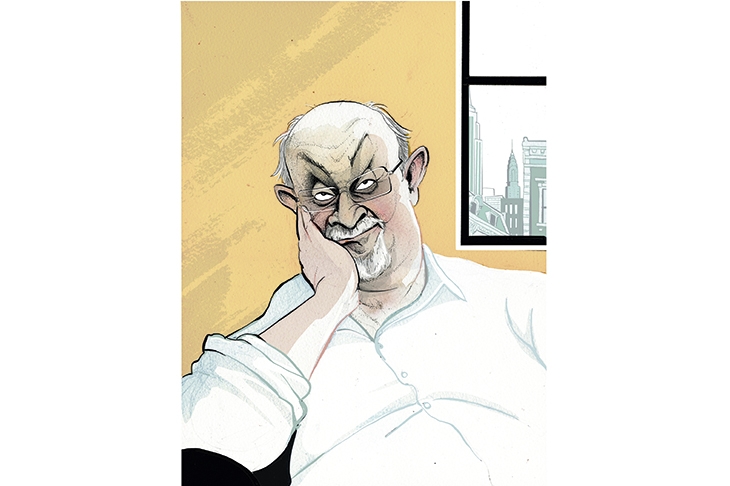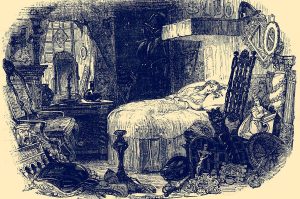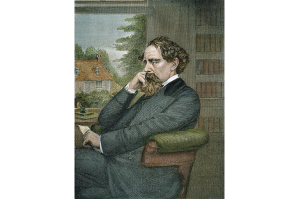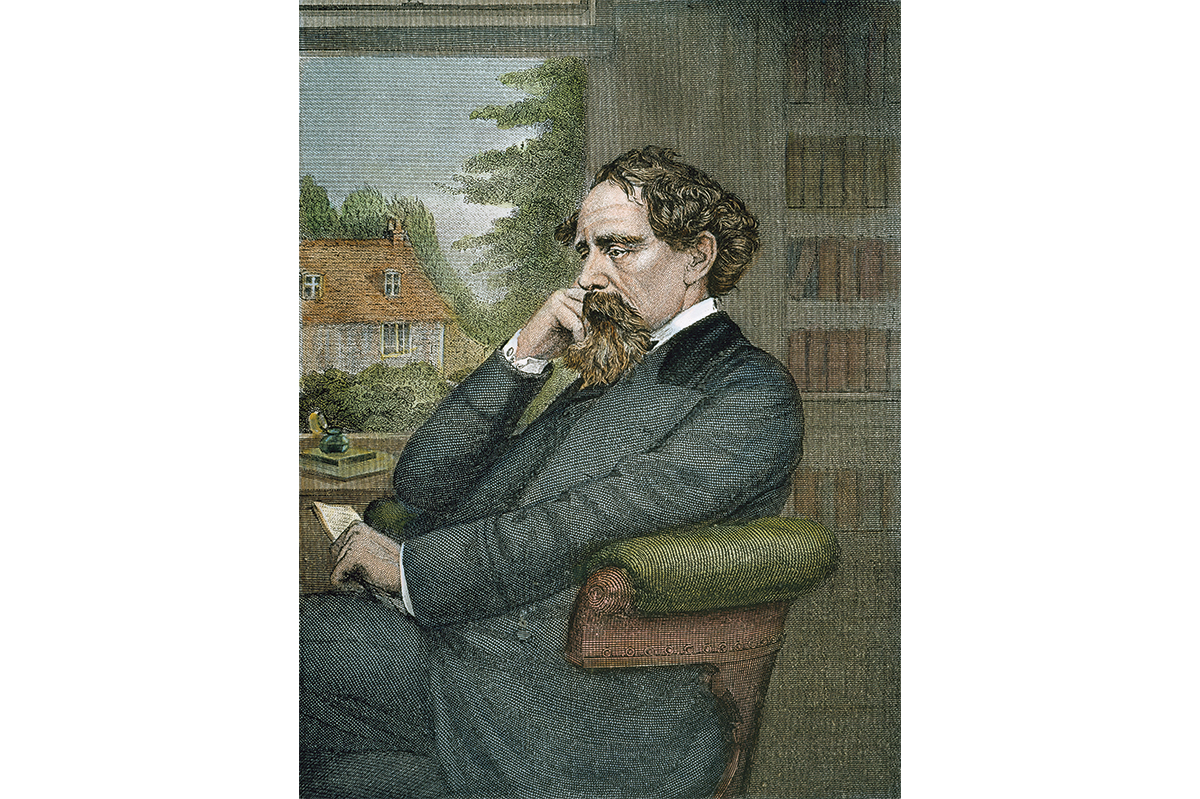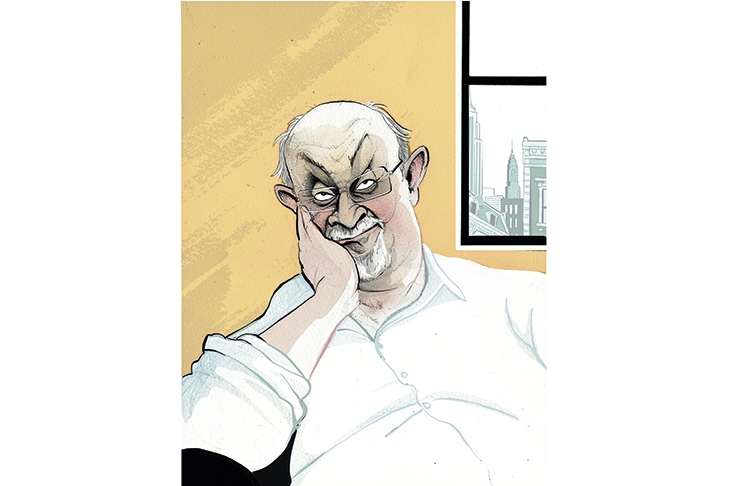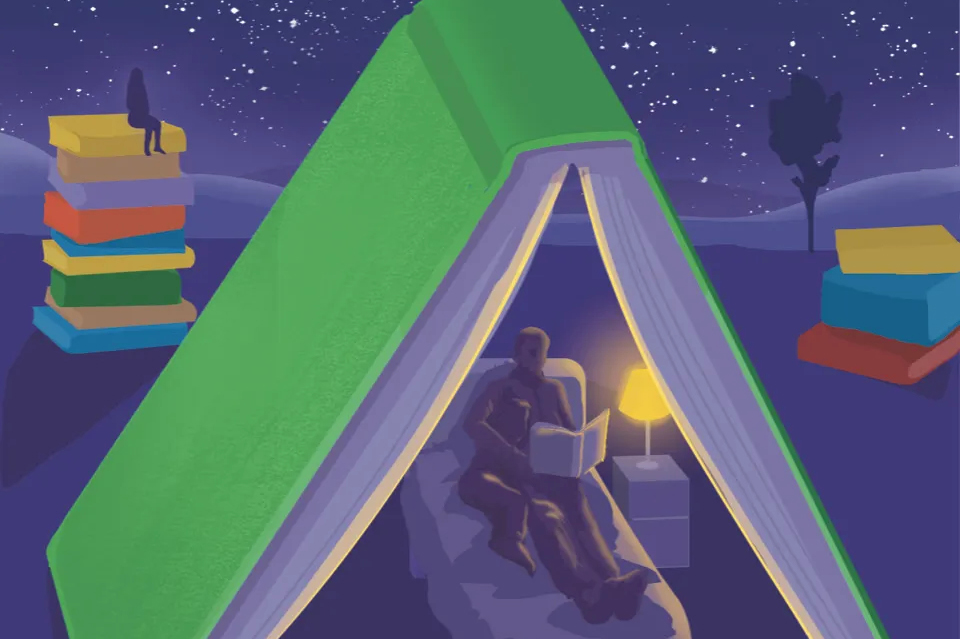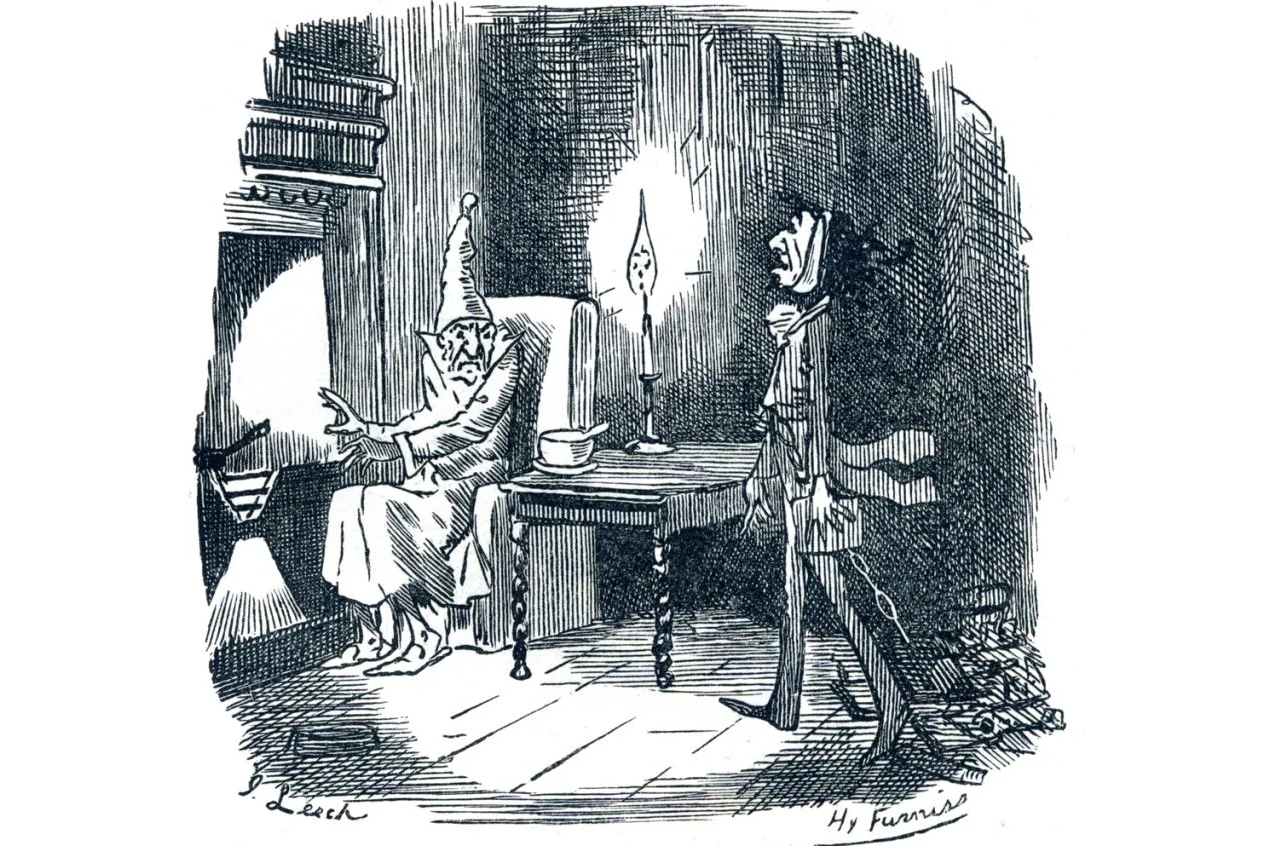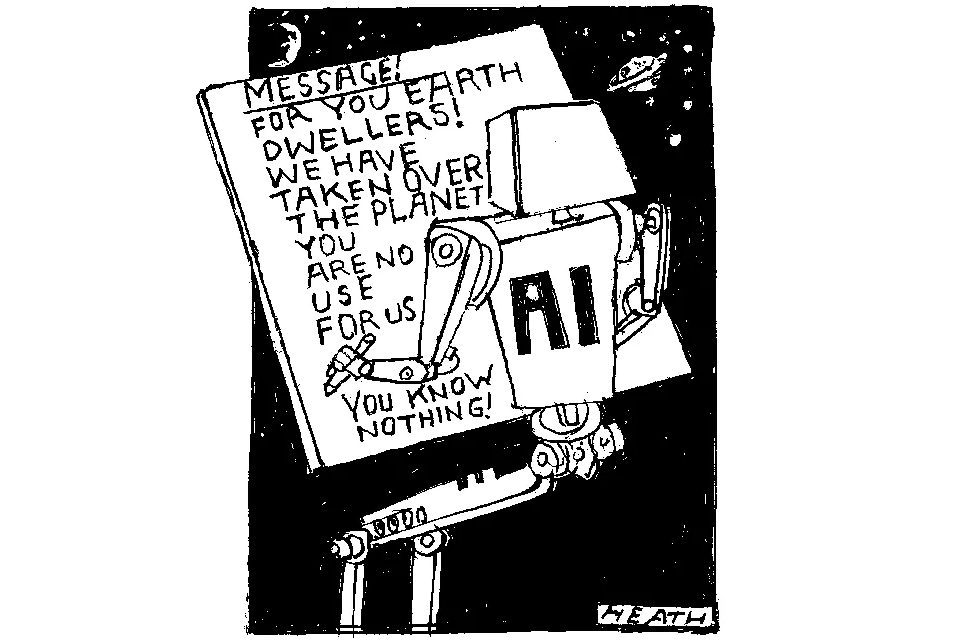‘Things that would have seemed utterly improbable now happen on a daily basis,’ Sir Salman Rushdie tells me. ‘The implausible has now become everyday.’ Isn’t this a problem for a writer whose books derive from the fantastical traditions of magic realism and science fiction, where crazy stuff happening is what sets them apart? ‘It is.’ The active threat to Rushdie’s life from radical Islam is two decades behind him. His novels have a way of dealing in sour, sometimes apocalyptic ironies. His latest, the Booker-shortlisted Quichotte, is set in what it describes as ‘the Age of Anything-Can-Happen’. His previous novel, The Golden House, was ‘almost entirely realistic’, he says, but Quichotte uses ‘all the tricks in the book’. Many of his stories have leant on existing myths: Orpheus in The Ground Beneath Her Feet, Scheherazade in Midnight’s Children; and the Quranic apocrypha for The Satanic Verses. For Quichotte (pronounced ‘key-shot’), Rushdie busts out the Knight of La Mancha — and, for good measure, Pinocchio. The result is a postmodern hall of mirrors and Rushdie’s funniest novel yet.The book’s Don Quixote is an elderly commercial traveler whose mind has been irrevocably dinged by watching too much TV. He sets off on a quest to win the heart of a beautiful TV star he’s never met, accompanied by a somewhat sullen son, Sancho, who starts out as a figment of his imagination and then starts to develop an independent existence. Sancho calls out of his own imagination a Jiminy Cricket character. Meanwhile Quichotte is imagined by a Manhattan-based author called Brother, who in turn is being imagined by the narrator, who in turn… Not to mention a substantial subplot about the opioid epidemic, and a New Jersey town whose population is turning into mastodons. It’s a ride. It also betrays a quite startling knowledge of trash culture. A couple of scholarly paragraphs on the reality show The Bachelor suggest it’s not just Quichotte who has been watching TV. ‘I did my due diligence,’ says Rushdie. ‘It was something I learnt early on from Charles Dickens…the thing that I admired about reading Dickens is how much of the culture he could write about. He is the absolute opposite of an ivory tower writer. I’ve always thought there is an aspect of the novel at its best which is reportorial. The writer has to go and find things out.’ Quichotte looks on the face of it to be about romantic love but is actually most deeply invested in the father-son relationship between Quichotte and Sancho. The tenderness of paternal love (Rushdie has two sons: Zafar, by his first marriage, and Milan, by his third) is a theme in Rushdie’s later work. His relationship with his own father, who terrified the young Salman when drunk, was tricky but colossally important. A recurring figure in Rushdie’s thinking and writing is the 12th-century Islamic polymath Ibn Rushd (called Averroes in the West). ‘My father made up the family name based on his fondness for Ibn Rushd. My grandfather wasn’t called Rushdie. Rushdie is not an ancient surname: my father made it up.’ Rushdie thinks ‘a lot’ about names. In Quichotte, an Elon Musk-style tech billionaire goes by the positively Pynchonian ‘Evel Cent’. ‘Dickens is the most wonderful namer. And in India when people choose names for children, they think very hard about the meaning of the name. It’s not just that’s a name in my family or a name I like the sound of but what does it mean?’ Rushdie is a secular writer who is very interested in religion (in Quichotte the matryoshka doll of authorship hints at the idea of God as an uber-author). ‘I think it’s because the world I grew up in, religion was everywhere. My father wasn’t religious at all and my mother’s extent of religion was that she didn’t want us to eat pork. We didn’t observe anything and my father was absolutely secularist but he was very interested in the philosophy of Islam. The reason I know about people like Ibn Rushd and so on is my father introduced me to them.’That interest in religion, notoriously, earned Rushdie a public death sentence in 1989. The fatwa from the Iranian ayatollah is the monolith in his career. Does it still affect his life? ‘No,’ he says, showing only slight peevishness. ‘It only affects my life when I talk to journalists. It is 20 years since I required any form of protection. I go everywhere I want.’ Does it annoy him when people like me bring it up? ‘It is frustrating.’ When I spoke to Bret Easton Ellis, he had a resigned acceptance: ‘[American Psycho] is going to be on my tombstone. I get it. I get it.’ Rushdie says: ‘For people who haven’t ever picked up a book of mine, I think it’s a deterrent, it makes them think of me as some arcane religious heretic and not interesting to them. I get all these letters saying: “Who knew that you were funny?” I say, well, people who read my books know. It feels like the albatross round the neck. The Satanic Verses was the fourth novel that I published. This is my 19th book and my 14th novel so most of my life as a writer has happened since then, and to be dragged back into the late 1980s is boring.’ Why, then, did he drag himself back in his 2012 memoir of that episode, Joseph Anton? ‘I knew that at some point that story had to be told but I didn’t want somebody else to do it.’ That book is gripping: self-revelatory, but also pretty vengeful. He’s scathing about friends and former friends who let him down during the fatwa, has harsh words for the critic James Wood and portrays his fourth wife Padma Lakshmi as a narcissistic gold digger. ‘Yes, but I didn’t see it as score-settling. In fact, I showed everybody everything that I was going to say and if they asked me to remove things, I removed them. I wasn’t trying to get anybody. I was just trying to say if you want to know about the life that I led, this is the life that I led at that time.’ The most piercing episode in Joseph Anton is one in which he reproaches himself, rather than others. He describes being taken on Christmas Eve 1990, to a London police station for a meeting with Muslim ‘community leaders’, arranged by Hesham el-Essawy, ‘an oleaginous Harley Street dentist who positioned himself as a moderate’. It wasn’t a parley so much as a show trial. Rushdie submitted to sign a document affirming the shahadah: ‘There is no God but God and Muhammad is his Prophet.’ ‘The worst day of my life,’ he says now. ‘I remember coming out of that meeting and calling my sister and saying, “I don’t know what I’ve done, I’ve done this,” and she said, “Have you lost your fucking mind?”’ Did it seem like a moral test that he had failed? ‘Yes, it did — and in retrospect, as I said in Joseph Anton, I think that is the moment I felt that I hit bottom…after that, I thought: I am never going to be untrue to myself in that way again, whatever happens.’ Rushdie was patient zero, in a sense, for the arguments over radical Islam and free speech which have dominated public life in the three decades since The Satanic Verses. ‘I am kind of a free speech absolutist; my view is I’d rather know what people think than have it suppressed and go under the carpet. My view is that unpleasant ideas don’t dematerialize if you ban them, they acquire sometimes the power of taboo and they actually increase in strength by being secret and covert.’ Rushdie says that in 15 years of teaching in the journalism school at NYU, he has never personally experienced ‘cancel culture’, but ‘I know it’s around’. ‘What I think is sad is that the censorious language which used to come from the right and the old is now coming from the left and the young, and it seems upside-down to me.’ He hesitates to blame the internet, but he’s troubled by it. The internet, with its boundary-crossing potential and its stew of registers and styles, ought to be a dream for a writer like Rushdie. ‘I was of that opinion for a long time but I just think something’s gone wrong…I do think the way in which social media has been used to deform democratic practices really is a problem.’ Rushdie is one of the most sociable and best connected and most successful of novelists, but he’s still a writer of transitions and changes, fresh starts and reinventions who has left styles, marriages and cities. Does America feel like home? ‘I ask myself this question,’ he says. ‘New York feels like home, because I’ve lived here 20 years…but whether America feels like home is a question I can’t answer really. I think America is a battle right now.’ He thinks he isn’t ‘quite seen as an American writer’, perhaps not even by himself. ‘If I had to describe myself in one sentence, I would say a Muslim and a big city writer of at least three metropolises — Bombay, London and New York. What happens in these big cities is that all these things mostly are compatible. Mostly people live side by side pretty well. Every so often they don’t, but mostly people do.’This article was originally published in
The Spectator’s 10,000th UK magazine. Subscribe to the US edition here.



